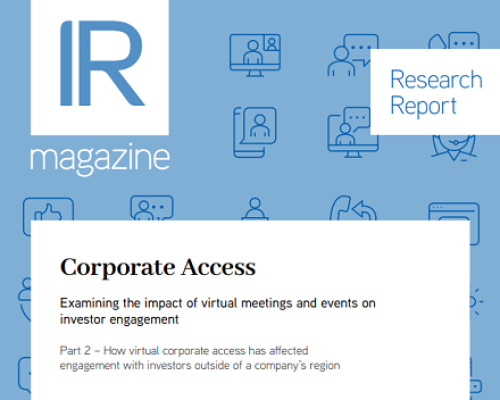The call for management time just gets louder and louder
The demand for corporate access remains as high as ever. This was certainly evident at a recent NIRI meeting in New York, where IR professionals described being ‘bombarded’ by requests for non-deal roadshows.
Underpinning this demand is a mass of investment banks, agency-only brokers, trading platforms and stand-alone corporate access firms, all of which are champing at the bit to provide management access to their investor clients.
This situation is both good and bad for issuers. On the one hand, it means you have an unprecedented number of companies fighting it out for your time, meaning you can be far choosier than in the past about which firms you travel with and what additional services you require.
The drawback, however, is the challenge of keeping all of your sell-side firms happy. ‘That drumbeat gets louder and louder, and companies have to be very sensitive to the needs of the Street,’ says Hulus Alpay, head of investor relations at New York-headquartered Medidata Solutions.
The pressure on company time for corporate access is highlighted by new research carried out by Ipreo, the market intelligence firm, which finds that 30 percent of large-cap companies and 20 percent of mid-cap companies used more than 10 brokers over the last 12 months for corporate access services (see How companies select a broker).
Market changes
Companies are now pretty used to the high demand. The services on offer, though, continue to evolve as corporate access firms look for ways to differentiate themselves from the crowd. Corporate access teams now offer a suite of products and services to suit the needs of different companies, which can only be a good thing for the investor relations industry.
This is especially true given the evolution of the trading landscape, which has made it harder for companies to understand how their stock is being traded (see What’s happening to my stock?).
Corporate access teams are often based on the trading floor, alongside a broker’s sales force and traders, so they are well positioned to pick up insight on what is moving the market on a particular day.
From this vantage point, corporate access partners can become a useful source of information for IROs as they try to interpret the various factors pushing and pulling on their stock during trading hours (see Insights from the trading floor).
Yet brokers can’t always meet the objectives companies set for them. The need for banks to service high-commission-generating clients means schedules are not always set up with a company’s best interests at heart.
Brokers are also limited by the extent of their relationships with the buy side. If a firm has a particular institution in mind, but the bank doesn’t have a relationship with that account, the desired meeting may never materialize.
To get around these problems, issuers are turning to third-party corporate access firms to bring some objectivity to their roadshow planning. Furthermore, there are web-based systems up and running that allow companies to organize their own roadshows online if they wish to (see Alternative route to the roadshow).
Meanwhile, technology is being used in other ways to bring together companies and the investment community. In the last couple of years, we’ve seen the rollout of telepresence services, offering investors that all-important chance to see the whites of the eyes without having to get on a plane.
Telepresence is an expensive option, however, and high-quality video conferencing is being offered as a cheaper alternative. Developments in the video conferencing market have raised hopes that desktop conferencing will improve the reach of IR departments, while also cutting down on travel costs (see Extending your reach).
International IR
Of course, in-person meetings remain an essential part of the job. For those traveling overseas for such excursions, this edition of Corporate Access is full of advice for the intrepid IR professional.
Increasingly, Asia is being viewed as a potential stopping-off point for firms looking for new sources of capital. Meanwhile, for non-US companies, a roadshow to the States remains a staple part of many IR programs.
The key to making a success of overseas roadshows lies in understanding the nuances of the local market, such as knowing that investors in the Middle East do not dabble so much in the secondary markets, and that getting commitment from investors in Asia is a long game (see Taking your message overseas).
Whether planning a trip at home or abroad, intelligent targeting is key to making the most of your corporate access efforts. Given the time constraints on management teams, IR departments are under pressure to make the most of the time they spend on the road.
As a result, keeping up with the changing nature of the investment landscape is vitally important, as is educating management teams on this topic so they understand why certain accounts are being targeted.
An increasing number of hedge funds, for example, are now operating long-only strategies based on company fundamentals. But many management teams remain reluctant to meet with these funds, given their reputation as short-term opportunists (see Five secrets of investor targeting).
However you go about your roadshow planning, remember there are scores of sell-side firms out there fighting for company time – so put pressure on your corporate access partners to provide a service that will keep both you and your management smiling while on the road.










